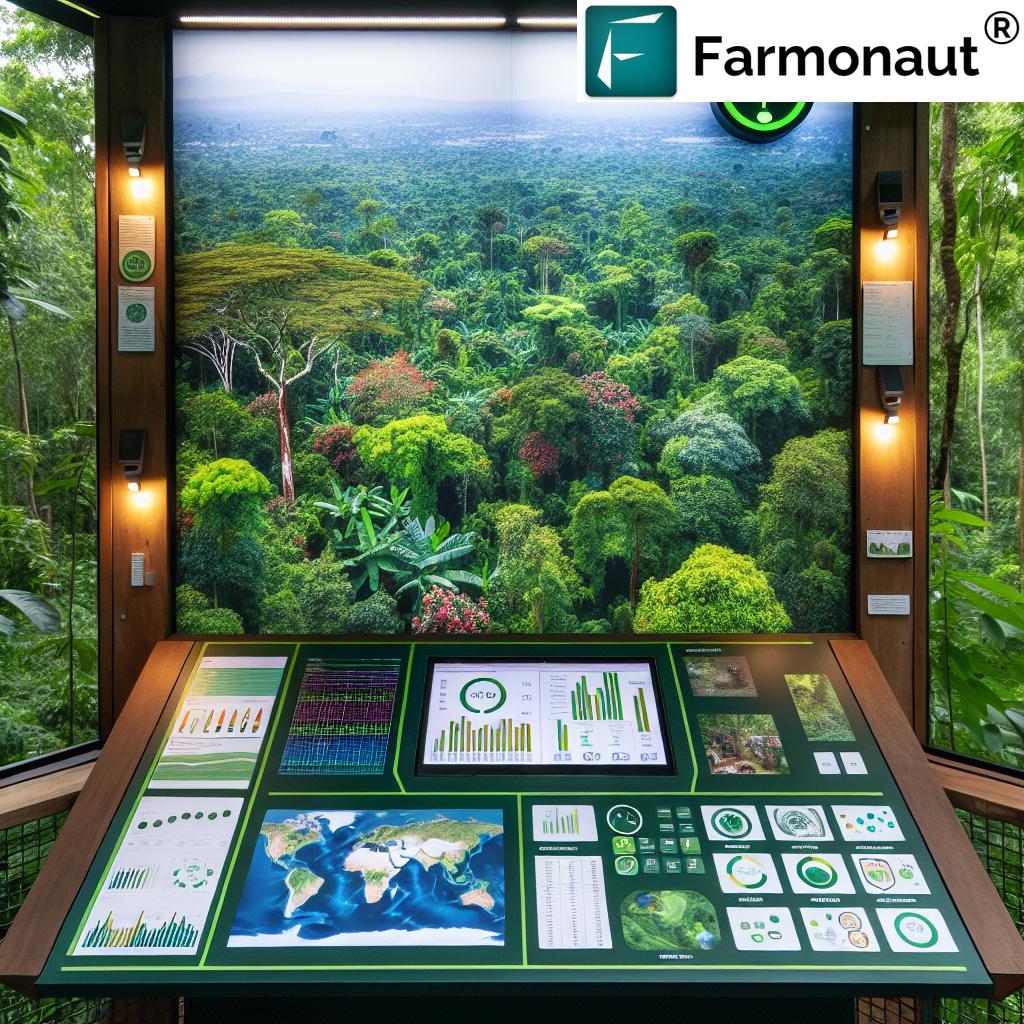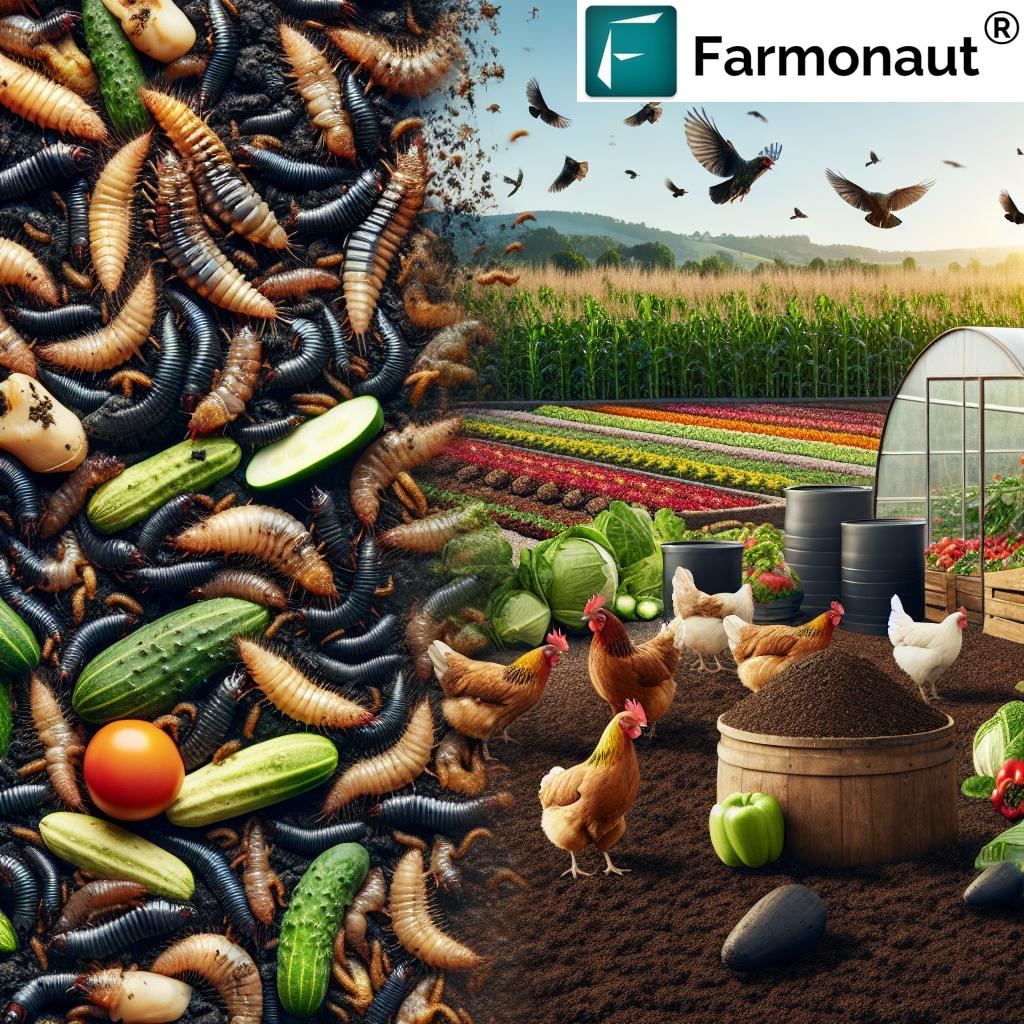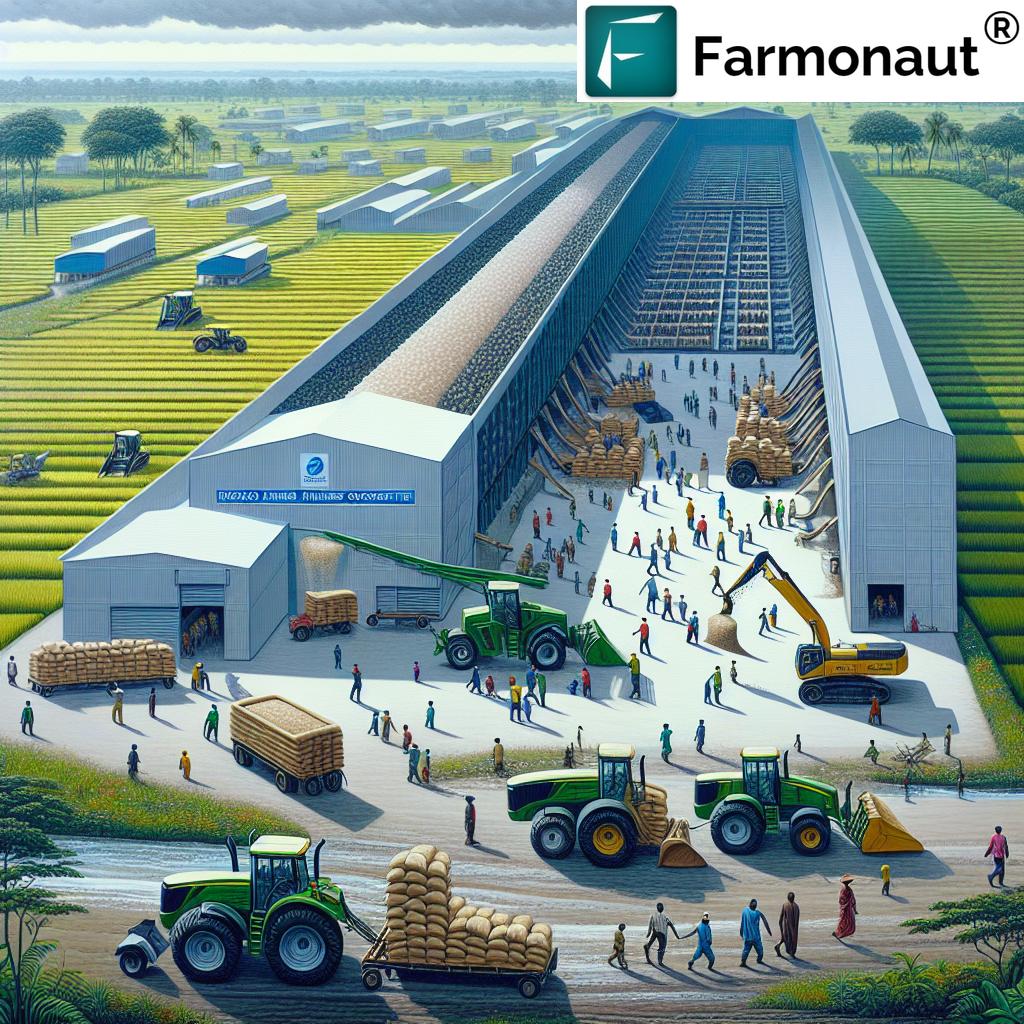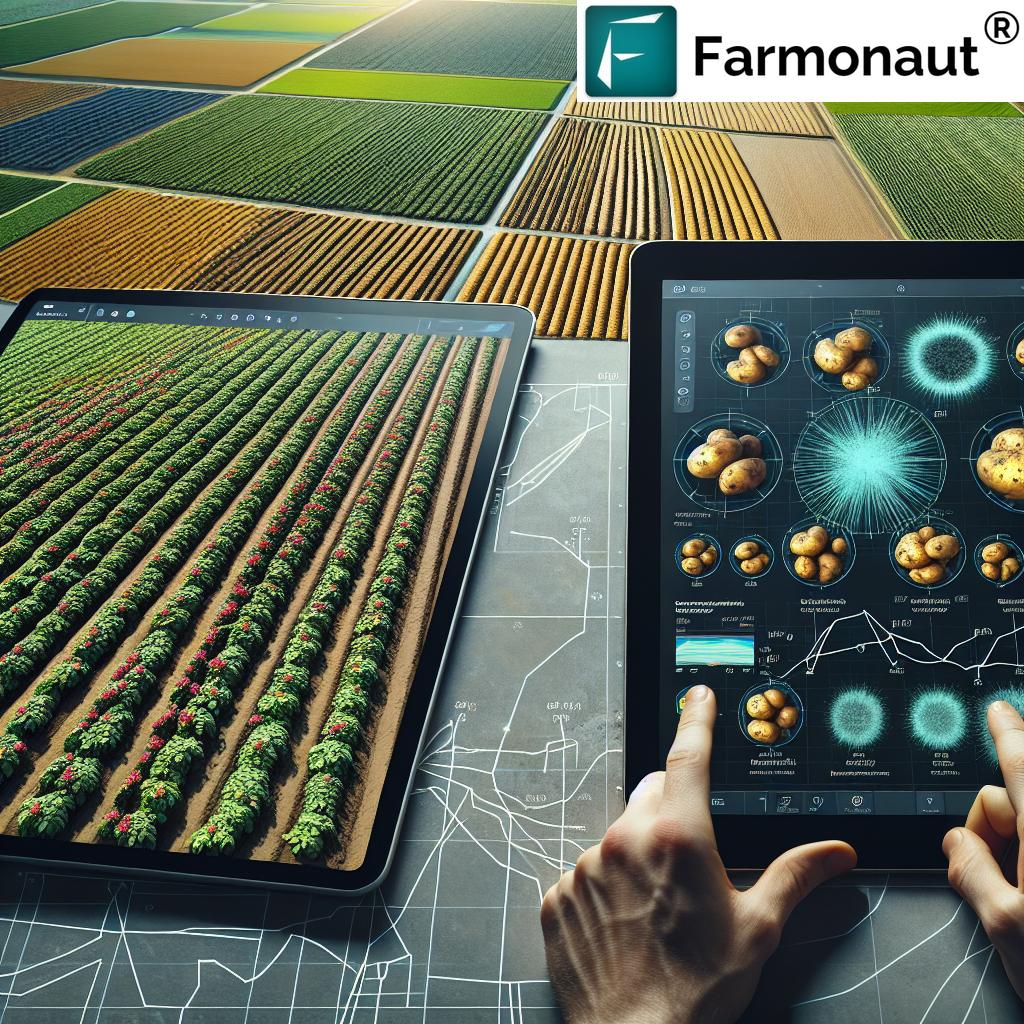Revolutionizing Sustainable Forestry: How Gabon’s Certification Initiative Protects Biodiversity and Empowers Local Communities
“Forest certification systems cover millions of hectares worldwide, protecting vast areas of biodiversity-rich ecosystems.”

In the realm of environmental conservation and sustainable resource management, few initiatives hold as much promise as Gabon’s groundbreaking forestry certification program. As we delve into this innovative approach, we’ll explore how it’s reshaping the landscape of sustainable forestry practices, protecting biodiversity, and empowering local communities. At Farmonaut, we’re excited to see how technology and data-driven solutions are playing a crucial role in this green revolution.
The Importance of Sustainable Forestry Practices
Sustainable forestry practices are at the heart of global efforts to combat climate change and preserve our planet’s precious ecosystems. As stewards of the Earth’s resources, we have a responsibility to manage our forests in a way that meets current needs without compromising the ability of future generations to meet theirs. This is where forest certification processes come into play, setting standards for responsible forest management and ensuring the long-term health of our woodlands.
The forest certification process involves a comprehensive evaluation of forest management practices against a set of predetermined criteria. These criteria typically encompass:
- Biodiversity conservation in forests
- Protection of water resources
- Soil conservation
- Sustainable timber harvesting
- Respect for indigenous peoples’ rights
- Worker safety and fair labor practices
By adhering to these standards, certified forests contribute significantly to environmental conservation initiatives and play a vital role in mitigating the impacts of climate change.
Gabon’s Innovative Approach to Forest Certification
“Gabon’s innovative forestry certification initiative empowers local communities while safeguarding over 90% of its forest cover.”
Gabon, a country in Central Africa, has taken a bold step towards sustainable forestry with its unique certification initiative. This program stands out for its comprehensive approach to forest stewardship, balancing ecological preservation with economic development. Let’s examine the key aspects of Gabon’s certification system:
- Extensive Coverage: The initiative aims to certify millions of hectares of Gabon’s forests, covering a significant portion of the country’s total forest area.
- Biodiversity Protection: A primary focus is on preserving the rich biodiversity of Gabon’s forests, home to countless species of flora and fauna.
- Community Empowerment: The program actively involves local communities in forest management decisions, ensuring their voices are heard and their livelihoods are protected.
- Sustainable Resource Utilization: It promotes responsible timber harvesting practices that maintain the forest’s long-term health and productivity.
- Climate Change Mitigation: By preserving vast tracts of forest, the initiative contributes significantly to carbon sequestration efforts.
This innovative approach serves as a model for other nations seeking to implement effective forest certification systems. It demonstrates how government policy, stakeholder engagement, and environmental stewardship can work in harmony to achieve sustainable forestry goals.
The Role of Technology in Modern Forest Management
In the digital age, technology plays a pivotal role in revolutionizing forest management practices. At Farmonaut, we understand the power of data-driven solutions in enhancing transparency and integrity in the forestry sector. Our satellite-based monitoring systems and AI-powered analytics tools are helping forestry managers make informed decisions about resource allocation, conservation efforts, and sustainable harvesting practices.
Here are some ways technology is transforming sustainable forestry:
- Satellite Imagery: High-resolution satellite data allows for real-time monitoring of forest health, detecting changes in vegetation cover, and identifying areas at risk of deforestation.
- AI and Machine Learning: These technologies help in analyzing vast amounts of data to predict forest growth patterns, assess biodiversity, and optimize resource management.
- Blockchain: Enhances traceability in the timber supply chain, ensuring that wood products come from certified, sustainably managed forests.
- Drones: Enable detailed mapping of forest areas, assisting in inventory management and monitoring of hard-to-reach locations.
- Mobile Apps: Facilitate on-the-ground data collection by forest managers and local communities, improving the accuracy and timeliness of forest assessments.
By leveraging these technological advancements, we can significantly enhance the effectiveness of forest certification processes and sustainable resource management practices.
Comparative Analysis of Forest Certification Systems
| Certification System | Area Certified (million ha) | Key Focus Areas | Implementation Challenges | Technology Integration | Impact on Local Communities | Biodiversity Conservation Measures | Climate Change Mitigation Potential |
|---|---|---|---|---|---|---|---|
| FSC (Forest Stewardship Council) | 200 | Biodiversity, Indigenous rights | Complex criteria, high costs | Satellite monitoring, blockchain | High – community involvement in decision-making | Strict protection of high conservation value forests | Strong – emphasis on forest preservation |
| PEFC (Programme for the Endorsement of Forest Certification) | 325 | Sustainable management, local adaptability | Varying standards across countries | GIS mapping, remote sensing | Moderate – focus on local economic benefits | Habitat protection, species diversity promotion | Moderate – balances use and conservation |
| SFI (Sustainable Forestry Initiative) | 150 | Water quality, wildlife habitat | Limited global recognition | AI for forest inventory | Moderate – emphasis on logger training | Wildlife corridors, invasive species control | Moderate – focuses on sustainable harvesting |
| Gabon Certification Initiative | 20 | Biodiversity, community empowerment | New system, establishing credibility | Satellite imagery, mobile apps | Very High – central to program design | Comprehensive ecosystem approach | Very Strong – preserves vast forest areas |
This comparative analysis highlights the diverse approaches to forest certification across the globe. While each system has its strengths, Gabon’s initiative stands out for its strong focus on community empowerment and biodiversity conservation. The integration of advanced technologies, such as those offered by Farmonaut, is a common thread among these certification systems, demonstrating the crucial role of innovation in modern forestry practices.
Biodiversity Conservation: A Core Component of Sustainable Forestry
Biodiversity conservation in forests is not just an environmental imperative; it’s a cornerstone of sustainable forestry practices. Gabon’s certification initiative places a strong emphasis on preserving the rich tapestry of life within its forests. This approach recognizes that healthy, diverse ecosystems are more resilient to environmental stresses and provide a wider range of ecosystem services.
Key strategies for biodiversity conservation in certified forests include:
- Establishing protected areas within managed forests
- Maintaining wildlife corridors to facilitate animal movement
- Preserving old-growth forests and habitats of endangered species
- Implementing sustainable hunting and fishing practices
- Controlling invasive species that threaten native biodiversity
By prioritizing biodiversity, forest certification systems like Gabon’s ensure that forests continue to support a wide array of plant and animal species while still providing economic benefits to local communities.
Empowering Local Communities through Sustainable Forestry
One of the most remarkable aspects of Gabon’s certification initiative is its focus on empowering local communities. This approach recognizes that sustainable forestry is not just about preserving trees; it’s about creating a harmonious relationship between people and forests. By involving local communities in forest management decisions, the initiative ensures that those who depend on the forest for their livelihoods are active participants in its conservation.
Some ways in which the certification program empowers local communities include:
- Providing training in sustainable forestry practices
- Creating job opportunities in forest management and eco-tourism
- Ensuring fair compensation for forest products
- Recognizing and respecting traditional forest knowledge
- Involving community members in biodiversity monitoring efforts
This community-centric approach not only enhances the effectiveness of forest conservation efforts but also contributes to sustainable local development, improving the quality of life for forest-dependent communities.
Explore Farmonaut’s API for advanced forestry solutions
The Intersection of Policy, Innovation, and Stakeholder Engagement
The success of Gabon’s forest certification initiative lies in its ability to effectively blend policy, innovation, and stakeholder engagement. This multifaceted approach ensures that all aspects of sustainable forestry are addressed comprehensively.
- Policy Framework: Gabon has implemented robust policies that support sustainable forestry practices, providing a solid foundation for the certification program.
- Technological Innovation: The integration of cutting-edge technologies, such as those provided by Farmonaut, enhances the efficiency and effectiveness of forest management practices.
- Stakeholder Engagement: By involving various stakeholders – from local communities to international organizations – the initiative ensures a balanced approach to forest stewardship.
This synergy between policy, innovation, and engagement creates a powerful framework for sustainable forestry that can serve as a model for other countries and regions.
Check out our API Developer Docs for integrating forestry solutions
Climate Change Mitigation and Forestry
Forests play a crucial role in mitigating climate change, acting as natural carbon sinks that absorb and store vast amounts of carbon dioxide. Gabon’s certification initiative recognizes this vital function and incorporates climate change considerations into its forest management strategies.
Key aspects of climate change mitigation in certified forests include:
- Preserving and expanding forest cover to maximize carbon sequestration
- Implementing sustainable harvesting practices that maintain forest carbon stocks
- Promoting reforestation and afforestation projects
- Reducing emissions from deforestation and forest degradation (REDD+)
- Enhancing forest resilience to climate-related stresses
By prioritizing these climate-focused strategies, Gabon’s forest certification system contributes significantly to global efforts to combat climate change while ensuring the long-term sustainability of its forest resources.

Challenges and Solutions in Implementing Forest Certification
While forest certification systems offer numerous benefits, their implementation is not without challenges. Understanding these obstacles and developing effective solutions is crucial for the success of initiatives like Gabon’s.
Common challenges include:
- High costs of certification for small forest owners
- Complexity of certification standards and processes
- Limited market recognition for certified products
- Balancing conservation goals with economic needs
- Ensuring consistent application of standards across diverse forest types
To address these challenges, Gabon and other forest certification systems are implementing innovative solutions:
- Group certification schemes to reduce costs for small forest owners
- Simplified certification processes for small and medium enterprises
- Public awareness campaigns to increase demand for certified forest products
- Adaptive management approaches that allow for local context considerations
- Continuous improvement of standards based on scientific research and stakeholder feedback
By addressing these challenges head-on, forest certification systems can enhance their effectiveness and expand their positive impact on global forest conservation efforts.
The Future of Sustainable Forestry: Trends and Innovations
As we look to the future of sustainable forestry, several exciting trends and innovations are emerging that promise to further enhance forest management practices:
- Precision Forestry: Advanced technologies like LiDAR and hyperspectral imaging are enabling more precise forest inventory and management.
- Artificial Intelligence in Forest Management: AI algorithms are being developed to predict forest growth patterns, detect diseases, and optimize harvesting schedules.
- Blockchain for Timber Traceability: Blockchain technology is enhancing transparency in the timber supply chain, reducing illegal logging and ensuring the integrity of certified forest products.
- Carbon Markets and Forest Credits: Emerging carbon markets are providing new economic incentives for forest conservation and sustainable management.
- Bioeconomy and Forest Products Innovation: Research into new, sustainable forest products is opening up new economic opportunities while promoting forest conservation.
These innovations, combined with evolving certification standards and increasing global awareness of the importance of forests, paint a promising picture for the future of sustainable forestry.
The Role of Farmonaut in Supporting Sustainable Forestry
At Farmonaut, we’re proud to contribute to the advancement of sustainable forestry practices through our cutting-edge technology solutions. Our satellite-based monitoring systems and AI-powered analytics tools provide forest managers with valuable insights for making informed decisions about resource allocation, conservation efforts, and sustainable harvesting practices.
Key features of Farmonaut’s technology that support sustainable forestry include:
- Real-time forest health monitoring using multispectral satellite imagery
- AI-driven advisory systems for optimized forest management
- Blockchain-based traceability solutions for timber supply chains
- Carbon footprint tracking to support climate change mitigation efforts
- Fleet and resource management tools for efficient forestry operations
By leveraging these technologies, forest certification systems like Gabon’s can enhance their effectiveness, improve transparency, and accelerate progress towards sustainable forestry goals.
Conclusion: A Green Future Through Sustainable Forestry
Gabon’s innovative forest certification initiative represents a significant step forward in the global effort to protect our planet’s forests while supporting local communities and economies. By combining strong policy frameworks, stakeholder engagement, and cutting-edge technologies, this approach offers a model for sustainable forestry that can be adapted and implemented worldwide.
As we continue to face the challenges of climate change and biodiversity loss, initiatives like Gabon’s certification program, supported by technology solutions from companies like Farmonaut, give us hope for a greener, more sustainable future. Through responsible forest management, we can preserve the world’s forests for generations to come, ensuring they continue to provide vital ecosystem services, support biodiversity, and contribute to global climate stability.
The journey towards truly sustainable forestry is ongoing, but with continued innovation, collaboration, and commitment, we can create a world where forests thrive alongside human communities, supporting both ecological balance and economic prosperity.
FAQ: Sustainable Forestry and Certification
Q: What is forest certification?
A: Forest certification is a process that verifies that forests are being managed according to a set of agreed-upon environmental, social, and economic standards. It aims to promote sustainable forestry practices and responsible forest management.
Q: How does forest certification benefit local communities?
A: Forest certification often includes provisions for community involvement in forest management decisions, fair labor practices, and respect for indigenous rights. This can lead to improved livelihoods, better working conditions, and greater community empowerment.
Q: What role does technology play in sustainable forestry?
A: Technology, such as satellite imagery, AI, and blockchain, plays a crucial role in monitoring forest health, optimizing resource management, enhancing traceability in timber supply chains, and improving overall efficiency in forestry operations.
Q: How does sustainable forestry contribute to climate change mitigation?
A: Sustainable forestry practices help mitigate climate change by preserving and expanding forest cover, which acts as a natural carbon sink. It also promotes responsible harvesting practices that maintain forest carbon stocks and supports reforestation efforts.
Q: What makes Gabon’s forest certification initiative unique?
A: Gabon’s initiative stands out for its comprehensive approach that balances biodiversity conservation, community empowerment, and economic development. It also leverages innovative technologies and has a strong focus on preserving the country’s vast forest resources.
















